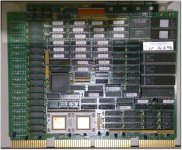iainmaoileoin
Experienced Member
HELP!
I have written a TK50 boot tape for BSD 2.11 - to send off to someone. I could not squeeze the whole thing onto 1 tape so the write of the last file failed. (So it is a two tape job....) but that is another story.
Anyway, my problem is that when I use BSD to read back the blocks from the (first blocks) of the tape it compares perfectly to the data that should be there. However when I try to boot (using the on-board roms on a mentec board) from the tape it wont.
The boot-rom printout explicitly say that "MU" handles TK50. If I offline the drive and try to boot off it, it says "drive offline" - reasonable evidence it is seeing the drive?
If I online the drive the boot winds the tape back and forward and the tape heads climb and fall (?seaching for the data track?).
[It looks like it is doing data read retries as the "fast flashing red light" appears before it tries again.]
After a failed tape boot, I go back to the disk boot, I can still read the tape and cmp the data to the boot block I wrote to it.
Thoughts:
1 the mentec board cannot actually boot off the TK50?
2 Interrupts (or DMA) missing during boot (but why does BSD work and read)
3 I have tried a second controller card. Same issues.
4 How can BSD write a tape it can read but that boot roms cant? I will go read the source of the drivers when I get a minute but I cant think why a tape written on a drive and reads on the drive wont boot from the drive.
Any thoughts?
Appreciated.
I have written a TK50 boot tape for BSD 2.11 - to send off to someone. I could not squeeze the whole thing onto 1 tape so the write of the last file failed. (So it is a two tape job....) but that is another story.
Anyway, my problem is that when I use BSD to read back the blocks from the (first blocks) of the tape it compares perfectly to the data that should be there. However when I try to boot (using the on-board roms on a mentec board) from the tape it wont.
The boot-rom printout explicitly say that "MU" handles TK50. If I offline the drive and try to boot off it, it says "drive offline" - reasonable evidence it is seeing the drive?
If I online the drive the boot winds the tape back and forward and the tape heads climb and fall (?seaching for the data track?).
[It looks like it is doing data read retries as the "fast flashing red light" appears before it tries again.]
After a failed tape boot, I go back to the disk boot, I can still read the tape and cmp the data to the boot block I wrote to it.
Thoughts:
1 the mentec board cannot actually boot off the TK50?
2 Interrupts (or DMA) missing during boot (but why does BSD work and read)
3 I have tried a second controller card. Same issues.
4 How can BSD write a tape it can read but that boot roms cant? I will go read the source of the drivers when I get a minute but I cant think why a tape written on a drive and reads on the drive wont boot from the drive.
Any thoughts?
Appreciated.

